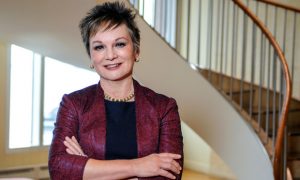Can Choate Keep Living Large by Thinking Small?
For nearly 120 years, Choate Hall & Stewart has stuck with its one-office approach in Boston, and put up some of the best financial numbers in the country. As competition floods into town, the firm is ready to be put to the test.
October 22, 2018 at 03:16 PM
11 minute read
 Choate Hall & Stewart's office in Boston.
Choate Hall & Stewart's office in Boston.
In Boston, tradition is sacred, and that extends to its legal industry.
As the city's legal market experiences a renaissance, one of its old-line firms, Choate Hall & Stewart, is remaining staunchly committed to a decades-old strategy, even if that means being a bit of a renegade.
The 163-lawyer firm was founded in Boston in 1899 by John Hall and Charles Choate Jr., who famously defended U.S. Industrial Alcohol Co. following the Great Molasses Flood of 1919. Despite having only one office, it has posted some of the best financial results among the Am Law 200.
“I would describe [Choate] as a high-caliber, authentic, classic Boston institution,” says Mary Rosenfeld D'Eramo, vice president of operations at attorney placement firm Mestel & Co. “It has clearly defined its value proposition to clients and laterals for years, even before differentiation was a buzzword.”
Last year, Choate's profits per equity partner were $2.311 million, placing it just outside the top 30 Am Law firms, and one spot behind its Boston rival Ropes & Gray. The firm also reported $1.454 million in revenue per lawyer in 2017, surpassed only by Wachtell, Lipton, Rosen & Katz, Sullivan & Cromwell, Irell & Manella, Kobre & Kim, Quinn Emanuel Urquhart & Sullivan and Kirkland & Ellis.
Now, facing more competition than ever at home, Choate has stuck with a strategy it adopted over 20 years ago. Instead of expanding its offerings and its footprint in recent decades like other firms, it's done almost the opposite, remaining lean and keeping its office local. So far, the results have been impressive, but as Kirkland & Ellis, Quinn Emanuel and others set up their own operations in Boston with big ambitions, the real test may still be to come.
Growing up in New Jersey, William “Bill” Gelnaw always thought he would end up practicing law in New York. But after working at a law firm in Manhattan, the Boston College Law School graduate decided the city wasn't for him. He returned to Boston and began looking at local firms.
 Choate co-managing partner Bill Gelnaw.
Choate co-managing partner Bill Gelnaw.“I thought the first time I walked in that the firm had a different culture than some other places I had walked into,” Gelnaw, who joined in 1984 as an associate, says of his first impression of Choate.
In 1992, he became partner in the private equity group and four years later was elected as co-managing partner of the firm, a position Gelnaw still holds today, alongside wealth management partner Charles Cheever. But Gelnaw's election to co-head the firm (at the time, he shared duties with litigation partner and current firm chairman John Nadas) marked a turning point in the firm's direction.
“The way people thought in the industry was bigger is better, more branch offices were better, more practice areas were better, all things to all clients in all places,” Gelnaw says. “We did a very careful, thoughtful, strategic planning process at that time in the mid-1990s. We ultimately decided we didn't want to do that. We wanted to pursue something very different.”
Bucking industry trends, Choate reduced its collection of practice areas from around 30 to just five: complex trial litigation; wealth management; life sciences and technology; private equity and M&A; and financing and restructuring. The firm's goal was to remain at the top of the market in each of those areas and work with clients to deliver value on their most sophisticated and important matters, while keeping its one-office model.
That strategy has contributed to some astounding financial growth over the last two decades.
Since 1998, when The American Lawyer first expanded its annual ranking to 200 firms, Choate's gross revenue has grown 184.6 percent, from $83 million to $236 million last year. Its profits per equity partner increased from $490,000 to $2.311 million in that time span, a growth of 371 percent. And its revenue per lawyer jumped from $465,000 to $1.454 million.
“We don't try to be all things to all people,” says Cheever, who succeeded Nadas in 2014 as co-managing partner. “We're concentrated on five core practice areas where we think we're practicing at the top of the market—and those areas are particularly important to our clients.”
Over the years, Choate has tackled all sorts of matters for clients of all sizes, but its sweet spot is the middle market. The firm has a deep roster of mid-market private equity and venture capital clients including Spectrum Equity, Summit Partners, Windjammer Capital and Riverside Partners, and it has handled more than 700 M&A and investment transactions since 2012 worth over $45 billion.
“They have a very, very strong private equity practice, and it's competitive with all the big firms: Kirkland & Ellis, Sidley Austin, Latham & Watkins, Wilmer Cutler Pickering Hale and Dorr, Goodwin Procter,” says Boston-based legal recruiter Mark Kwatcher.
Choate has also made significant investments in its nearly 80-lawyer life sciences and technology practice, which has established relationships with pharmaceutical and biotech companies Alnylam, Biogen and Celgene, among others. The firm's intellectual property and patent prosecution practice, meanwhile, has worked with Bain Capital Life Sciences, Deerfield and other private equity clients on their science and technology sector investments.
Then there's the firm longstanding—and distinctly Bostonian—wealth management practice, which accounts for roughly 14 percent of its annual revenue.
“In the 1800s, ship captains would go off to sea for a year and they would leave their money and financial affairs with their lawyers,” Cheever says. “So law firms in Boston developed this practice over time, and we've been doing it for 100 years.”
 Choate co-managing partner Charles Cheever.
Choate co-managing partner Charles Cheever.While many firms moved away from the practice, Choate has built it into one of the largest of any firm in the country, handling around $5 billion in assets for 130 families, including five of Forbes' richest families in America.
In addition, Choate established its own registered investment advisory arm—Choate Investment Advisors—that is staffed by investment professionals nestled within Choate's office in Boston's financial district.
“It's totally independent, in the sense that their job is to sit on the same side of the client and help them evaluate investment options,” Cheever says, noting income from its investment arm is not reported in the firm's yearly profits.
It's a high-level and hyper-specialized service, Rosenfeld D'Eramo says.
For Choate, “that is attractive to both clients that it works with, as well as the laterals that it brings in the door—and the people who stay with it,” she says.
On the lateral front, the nearly 120-year-old firm can point to a number of key recent additions. In 2016, it added a three-lawyer private equity team from Locke Lord. It also added a four-attorney group from Wilmer to its wealth management group in 2012. And following the dissolution of Boston-based Testa, Hurwitz & Thibeault in 2005, Choate added 10 of its partners, including Testa founder Stephen Hurwitz.
But even with these additions, Choate's head count has never grown much beyond 200 attorneys, with an average head count of 170 lawyers since the mid-1990s.
“Every department has several partners who are just exceptional and just absolutely at the top of the profession,” says former Choate partner and executive committee member Charles Johnson. He joined the firm in 2002 following the collapse of old-line Boston firm Hill & Barlow, where he co-chaired the technology and emerging companies group.
“You've got that collection of talent that's not diluted by hundreds of partners,” he says, “like the ones I saw at Hill & Barlow that had seen better days and spent part of the day reading the newspaper. Clients know that, and that generates a tremendous amount of client loyalty and success.”
At more than half of all law firms, general profitability is diluted by overcapacity and underperformance, Rosenfeld D'Eramo says. “But if you look at Choate, it has minimized loss and increased growth by minimizing the leverage and maximizing performance for clients with the hyper-specialization,” she says.
With 54 equity partners, Choate in 2017 had an average of two lawyers for every equity partner. By contrast, the average leverage for Am Law 100 firms last year was 3.6.
“We have a much more balanced leverage model than our competitors,” Cheever says.
That allows Choate's partners to directly lead client engagements and projects, he says. And in combination with the firm's single location, it also gives the firm's younger talent access to clients and sophisticated work earlier in their careers.
“I liked the fact that it was one office,” Johnson says. “I could walk down the hall and talk to management. When I had associates working for me, [I could] bring them in my office and get them around a roundtable.”
A large deal might be staffed with an equity partner, a senior associate and a junior associate, says Johnson, who was the assignment partner in the corporate department. But it's often just a partner and a single associate.
“The whole idea of a single office where you feel as though you're going to get attention—where you're not lost in the shuffle—is really, really compelling,” Johnson says.
In 2014, Choate added Ropes & Gray's Joan Lukey as a partner and chair of its complex trial and appellate litigation group. Lukey began her career at Wilmer predecessor Hale & Dorr in 1974 when that firm had merely 75 lawyers in a single office. The fact that Choate operated in a similar manner drew her in, she says.
“There's a warmth and sense of community,” she says. “People actually stop by to welcome you, want to get to know you, take you out for coffee, and that's because they know you're going to be together for years and years under that one roof.”
That sense of continuity, and the absence of a revolving door, is a big way Choate stands apart from other Am Law 200 firms, says Katherine Loanzon, associate recruiter at Kinney Recruiting.
“Choate will seek candidates who want to be in a more intimate environment and do excellent with sophisticated work and client interaction,” says Loanzon, who has worked with the firm on lateral hires. “They might not have the top 10 law firm name to them, but the perfect candidate is someone that wants to be there.”
 Joan Lukey, leader of Choate's complex trial and appellate practice.
Joan Lukey, leader of Choate's complex trial and appellate practice.While law firms typically have attrition built into their hiring processes, Choate explicitly does not.
“We don't hire 100 summer associates and hope that we're going to have 30 at the end of their third year,” Cheever says. ”Our goal when we hire somebody—when we hire everybody—is that they're going to spend their entire career here.”
Johnson, who retired from the firm in 2015 and now is an associate professor at the University of Massachusetts Amherst, agrees.
“The happiness level at Choate is pretty darn high,” he says, noting that in his 16 years at the firm there were very few lateral departures.
“I got lots of calls from headhunters, which I didn't even return,” he says. “I was working with really, really smart partners, great associates, and had a very successful practice, so there would be no reason to leave.”
Despite the optimism, Boston is changing. As more and more firms enter the market looking to poach top talent, the competition is fierce to retain it. Earlier this year, Choate lost its private equity co-chair and executive committee member Christian Atwood to Kirkland & Ellis.
Cheever puts on a brave face.
“Market disruption is great for us,” he says. “The more disruption there is in the marketplace, the better the opportunity we have to describe our differences and how they benefit both clients and our talent.”
And, he adds, “we kind of like our odds in that circumstance.”
Email: [email protected]
This content has been archived. It is available through our partners, LexisNexis® and Bloomberg Law.
To view this content, please continue to their sites.
Not a Lexis Subscriber?
Subscribe Now
Not a Bloomberg Law Subscriber?
Subscribe Now
NOT FOR REPRINT
© 2025 ALM Global, LLC, All Rights Reserved. Request academic re-use from www.copyright.com. All other uses, submit a request to [email protected]. For more information visit Asset & Logo Licensing.
You Might Like
View All
White & Case Crosses $4M in PEP, $3B in Revenue in 'Breakthrough Year'
6 minute read
Lawyers Across Political Spectrum Launch Public Interest Team to Litigate Against Antisemitism
4 minute read

Jones Day Names New Practice Leaders for Antitrust, Business and Tort Litigation and Latin America
Trending Stories
- 1Selendy Gay Files Lawsuit Challenging Trump's Workforce Reclassification EO
- 2Trump's DOJ Withdraws Opposition to Law Banning Trans Care for Minors
- 3Perkins Coie Backs Challenge to Trump's Ban on Transgender Military Service
- 4New Charges Expected in Sex Trafficking Case Against Broker Brothers
- 5With AI, What Changes Can Midsize Firms Expect?
Who Got The Work
J. Brugh Lower of Gibbons has entered an appearance for industrial equipment supplier Devco Corporation in a pending trademark infringement lawsuit. The suit, accusing the defendant of selling knock-off Graco products, was filed Dec. 18 in New Jersey District Court by Rivkin Radler on behalf of Graco Inc. and Graco Minnesota. The case, assigned to U.S. District Judge Zahid N. Quraishi, is 3:24-cv-11294, Graco Inc. et al v. Devco Corporation.
Who Got The Work
Rebecca Maller-Stein and Kent A. Yalowitz of Arnold & Porter Kaye Scholer have entered their appearances for Hanaco Venture Capital and its executives, Lior Prosor and David Frankel, in a pending securities lawsuit. The action, filed on Dec. 24 in New York Southern District Court by Zell, Aron & Co. on behalf of Goldeneye Advisors, accuses the defendants of negligently and fraudulently managing the plaintiff's $1 million investment. The case, assigned to U.S. District Judge Vernon S. Broderick, is 1:24-cv-09918, Goldeneye Advisors, LLC v. Hanaco Venture Capital, Ltd. et al.
Who Got The Work
Attorneys from A&O Shearman has stepped in as defense counsel for Toronto-Dominion Bank and other defendants in a pending securities class action. The suit, filed Dec. 11 in New York Southern District Court by Bleichmar Fonti & Auld, accuses the defendants of concealing the bank's 'pervasive' deficiencies in regards to its compliance with the Bank Secrecy Act and the quality of its anti-money laundering controls. The case, assigned to U.S. District Judge Arun Subramanian, is 1:24-cv-09445, Gonzalez v. The Toronto-Dominion Bank et al.
Who Got The Work
Crown Castle International, a Pennsylvania company providing shared communications infrastructure, has turned to Luke D. Wolf of Gordon Rees Scully Mansukhani to fend off a pending breach-of-contract lawsuit. The court action, filed Nov. 25 in Michigan Eastern District Court by Hooper Hathaway PC on behalf of The Town Residences LLC, accuses Crown Castle of failing to transfer approximately $30,000 in utility payments from T-Mobile in breach of a roof-top lease and assignment agreement. The case, assigned to U.S. District Judge Susan K. Declercq, is 2:24-cv-13131, The Town Residences LLC v. T-Mobile US, Inc. et al.
Who Got The Work
Wilfred P. Coronato and Daniel M. Schwartz of McCarter & English have stepped in as defense counsel to Electrolux Home Products Inc. in a pending product liability lawsuit. The court action, filed Nov. 26 in New York Eastern District Court by Poulos Lopiccolo PC and Nagel Rice LLP on behalf of David Stern, alleges that the defendant's refrigerators’ drawers and shelving repeatedly break and fall apart within months after purchase. The case, assigned to U.S. District Judge Joan M. Azrack, is 2:24-cv-08204, Stern v. Electrolux Home Products, Inc.
Featured Firms
Law Offices of Gary Martin Hays & Associates, P.C.
(470) 294-1674
Law Offices of Mark E. Salomone
(857) 444-6468
Smith & Hassler
(713) 739-1250










